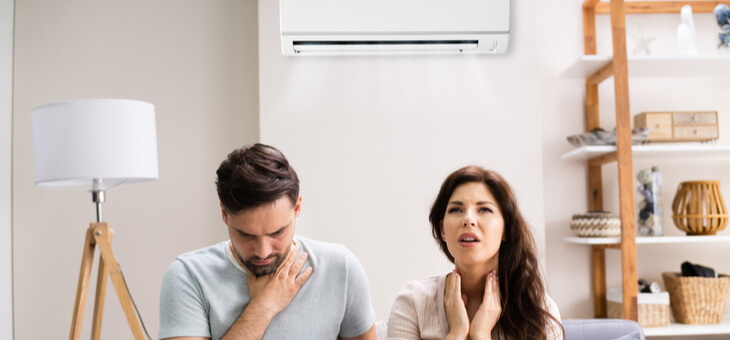Can air conditioning (AC) make you sick?
According to a study in the International Journal of Epidemiology, occupants of air-conditioned office buildings reported more symptoms of ill health than those who worked in buildings with natural ventilation.
“A large body of research has found that occupants of offices with air conditioning tend to report more sick building syndrome (SBS) symptoms than occupants of naturally ventilated offices,” says William Fisk, senior scientist (mechanical engineer) with the Indoor Environment Group.
“SBS symptoms are self-reported symptoms mostly of eye, nose or throat irritation and respiratory symptoms such as cough.”
So, what can aircon really do to your body?
Dehydration
Air-conditioning systems dry out the air. The air in the room passes over the condenser that will cool it down. As it cools down, the water vapour in the air forms water droplets. This water accumulates on the condenser and then is allowed to flow away.
This is useful if you live in an area with high humidity but if you spend a lot of time in an air-conditioned environment, it can dry you out too.
We constantly lose moisture from our bodies as part of our regular everyday physiological functions, that’s why we’re always being encouraged to drink more water. If you’re spending the majority of the day in a cool environment though, you may not feel the urge to replenish your fluid levels.
Dehydration has the potential to cause a range of problems including headaches, tiredness, dry lips, dry skin, and feeling light-headed.
Read: How proper hydration affects your body
Dry or itchy skin
Dry, itchy skin is often associated with dehydration, but it can also be attributed to other factors. One possible cause can be a response to contaminants in the air of a building. If the air-conditioning system is not cleaned or maintained as often as it should be, the air being circulated could contain pollutants or irritants.
Irritates airways
Staying in an air-conditioned room for a prolonged period can cause respiratory problems such as irritated nasal passages, trouble breathing and a dry throat.
Dry eyes
AC can cause evaporative dry eye if the temperature is set too cold. Your eyes are lined with tiny oil glands called meibomian glands. These glands secrete oil to coat the surface of our eyes and prevent the water component of our tears from evaporating. The meibomian glands’ ability to do their job is reduced if you’re in a very cold environment for a prolonged time.
This can make your eyes irritated and itchy, and may even make your vision blurry.
Read: How to soothe dry eyes
Worsen asthma and allergies
Often, staying inside can help you avoid common allergens but aircon can worsen these conditions. If the system is not properly cleaned and maintained, it can become the perfect breeding ground for mould to thrive.
If mould is in your AC unit, the air it’s circulating will contain mould spores that can increase your exposure to asthma and allergy triggers.
Disease and illness
Air-conditioning units can be an origin of Legionnaires’ disease.
The Legionella pneumophila bacteria causes the disease, and it’s often connected to contaminated AC plants in large buildings. Symptoms include a severe pneumonia-like chest infection and fever, chills, cough, muscle aches, and shortness of breath.
Also, suddenly going from sweltering heat to freezing air conditioning, whether it’s your house, work, or car, can be a strain on your body. One study found that doing that transition regularly can harm your lungs, making you more vulnerable to respiratory illnesses.
Positives of air conditioning
Many of these health symptoms are due to a lack of fresh air, lack of moisture in the air, or the recirculation of air in an environment that contains pollutants. But AC can be great for your health too.
It helps you sleep
Experts say sleeping in a room that’s between 15.6 to 19.4 degrees C is ideal for the best rest. This is because your body cools down as part of a natural sleep cycle, so a cool room helps that happen.
Read: Expert says fans better than air conditioning during heatwaves
It helps you think
Living and working in the heat isn’t great for your brain.
A study by Harvard found that in hot summers students who lived in dormitories without AC did worse on cognitive tests than those who had cool, refreshing central air. The difference was particularly noticeable in the afternoons when the outside world began to cool but their dorms were still roasting.
It may boost metabolism
Spending more time in the cold may help you lose weight. One study found that keeping your AC set to colder temperatures at night can stimulate brown fat activity and increase your resting metabolic rate, helping you burn more fat.
Do you have air conditioning? How often do you use it? Why not share your thoughts in the comments section below?
If you enjoy our content, don’t keep it to yourself. Share our free eNews with your friends and encourage them to sign up.

